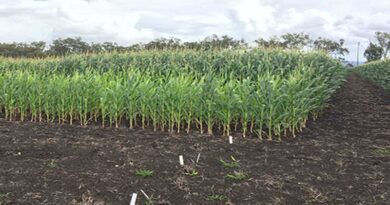Trace Element Deficiencies in Australian Crops
26 August 2022, AU: Crops require trace elements to grow, thrive and survive, but only in small amounts. As a result, these are often overlooked when we are looking at our yearly crop inputs.
A healthy addition of trace elements is just as important for producing profitable crops as nitrogen and phosphorus, especially because many Australian soils are deficient in trace elements in their native condition.
Because we are producing such high quality grain and large yields, we are at constant risk of not replacing enough micronutrients back into the soil.
The use of foliar sprays will usually correct a problem in the crop. However, for long term correction of the deficiency we need to boost the nutrient reserves in our soils.
Trace Elements applied as a foliar have the benefit of being easily absorbed and translocated readily within the plants. They are also easily decomposed within the plant so that they can become available straight away.
Using a foliar as a Soil Application is highly stable and will not easily allow the nutrient to be replaced by other elements within the soil.
| Micro-Nutrient | Soil Type | Susceptible Crop |
| Zinc | Heavily eroded soils, acid soils, coarse sands, Waterlogged soils. | Beans, Soybeans, Corn, Sorghum, Rice, Cereals |
| Boron | Coarse sandy soils, High Acid soils, peats | Lucerne, Lupins, Peas, Clover, cotton, corn, canola |
| Cobalt | Essential for nitrogen fixation | Pastures |
| Iron | Alkaline Soils, waterlogged soils | Beans, Soybeans, Corn, Sorghum |
| Molybdenum | Weathered Acidic soils | Canola, Legumes |
| Manganese | Sandy soils, Calcareous soils | Legumes, Cereals, Cotton, Canola |
| Copper | Sandy loams, acidic soils | Cereals |
If crops are deficient in any one of these micronutrients it can cause the crop to struggle with the production of carbohydrates for energy, reproductive growth and seed development, thus leading to reduced crop yields. Yield losses can also occur when crops are only marginally deficient and before symptoms of deficiency are seen.
The best way to diagnose a trace element deficiency is to complete a plant tissue test in crop or as part of your regular soil sampling.
OmniTrace is a chelated form of trace elements. A chelate is an organic compound that protects the metallic elements, such as Fe, Zn & Cu. Chelated trace elements are also resistant to micro-biological decomposition, and are soluble in water, therefore mix with a wide range of chemical inputs.
Note: A jar test is always recommended prior to mixing large quantities.
Shop for Crop Nutrition Products
Find the crop nutrition products you need at FBN Direct®. We have a diverse portfolio to provide product options for growers like you to support plant health.
Also Read: Punjab government bans 10 agrochemicals to save basmati rice exports
(For Latest Agriculture News & Updates, follow Krishak Jagat on Google News)















